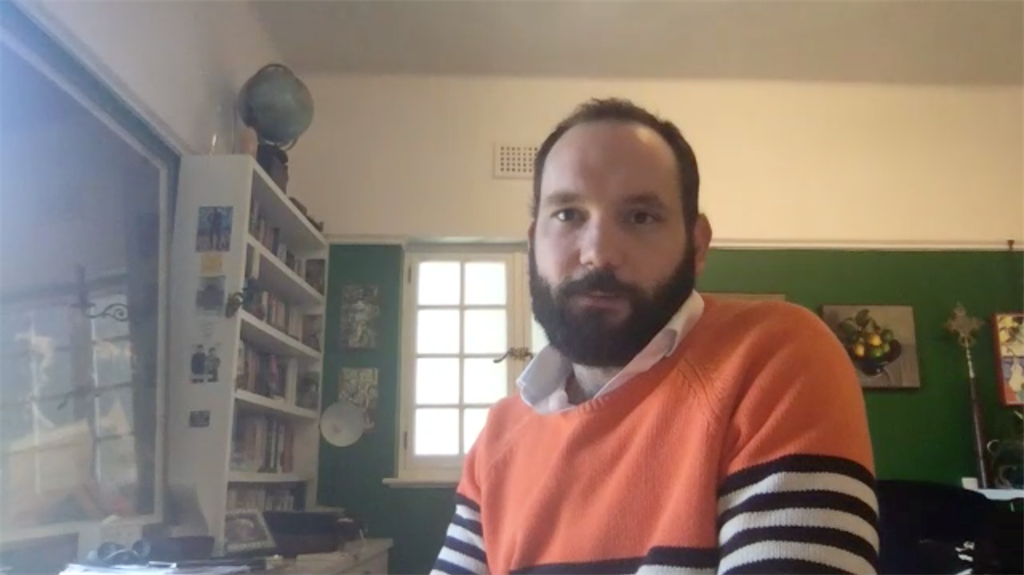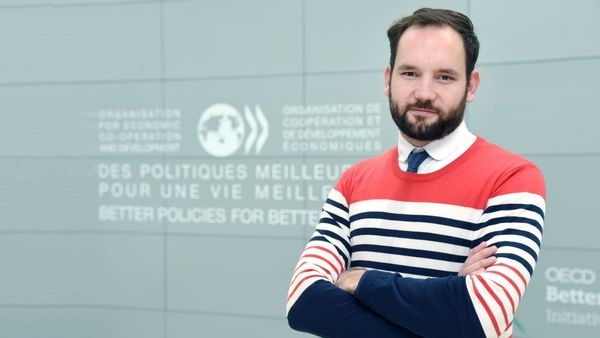Dr Nic Spaull, the man who led the report President Cyril Ramaphosa referred to a day after it was released, believes that 10 years from now, South Africans might be grateful for Covid-19 – and that a “regular 2020” would not have benefited the country.
Doctor in Economics Nic Spaull sees Covid-19 as South Africa’s Damascus moment – a turning point to create a more equal and just country for all those who live in it.
Two days since the release of an explosive report that he led and co-authored, which revealed that three million South Africans lost their jobs during the nationwide lockdown so far, Spaull believes that Covid-19 might be exactly what South Africa needed.
“If we just had a regular 2020, we would have just carried on frying this frog; boiling the frog slowly,” Spaull says, referring to the well-known fable that, if a frog is put in cold water and the water is warmed slowly until it boils, the frog will be boiled alive as it grows accustomed to the warming temperature. But, if the frog is placed in boiling water from the start, it will jump out.
“This (Covid-19) is like you just radically ramped up the heat,” Spaull adds.
He notes:
And now everyone’s like: ‘We’re boiling.’ [Everyone] jumps out of the pots. ‘We can’t do this anymore.’
Spaull, dressed in a bright orange and blue striped jersey – similar to the jersey he is often pictured in, says Covid-19 is going to force South Africans to address the stark inequalities that exist in the country.
And it’s going to force a response to maintain social-political stability.
He was speaking to News24 during a video call from his home in Gardens, Cape Town, minutes after he sent an email thanking the team of 30 social science researchers from five South African universities who worked tirelessly over the past three months to complete the report.
Everyday Hero | Maggie Losper: Feeding and clothing Vryburg, one person at a time
In the left-hand corner, a desk was covered with paperwork and on it, is a box of tissues and framed pictures of friends and family.
Next to the desk, a large white bookshelf filled to the brim could be seen against green walls. A large wooden-framed window in the middle of the room, painted white, let in the crisp mid-morning winter sunlight after days of non-stop rain in Cape Town.



Dr Nic Spaull during his interview with News24 (screenshot)
It was in this room, during the height of winter, where 33-year-old Spaull conceptualised and implemented the study to get to the bottom of Covid-19 and the effect of the national lockdown on South Africans.
“The logic behind why we need this information was so obvious to me. It was like: this is so clear that we need to get this information and that if we don’t, we’re fucked,” a bearded Spaull says.
Everyday Hero | Brandon Pillay: Chatsworth’s selfless saviour
His idea quickly grew from where he first mentioned it in a weekly staff meeting at Stellenbosch University, three days before the country’s hard lockdown was enforced, to conversations with the statistician-general, the Presidency, and the head of South Africa’s Covid-19 ministerial advisory council, Salim Abdool Karim.
He says:
It’s like you can see the tidal wave coming. It was so obvious to me that this is going to cause devastation, unlike things that we’ve seen in our lifetime. We have to get this in place.
Among the National Income Dynamics Coronavirus Rapid Mobile report’s startling results, deduced from interviews with 7 000 households across South Africa, was that of the three million people who lost their jobs in the first few weeks of the national lockdown, two million were women.
The report also found that the richest 25% was also least affected by the crisis, with only 8% in that income bracket being retrenched, compared to 30% of people in the poorest 50% of the country who were retrenched between February and April.
Everyday Heroes | Donovan & Hendrik: Two beloved drivers helping Stellenbosch farmworkers during lockdown
“The coronavirus pandemic is the largest social and economic shock in our lifetime,” the introduction of the report reads.
Spaull, a senior researcher at Stellenbosch University’s social-economic policy unit and the founder of reading programme Funda Wande, says 10 years from now, the country might look back and be grateful for the events of 2020.
We might look back and say: ‘Shit, you know, the crisis was terrible, but we got out of it, a national health insurance, [and] the basic income grant.’ We might be able to list a number of things that actually put our country on a more equal footing.
He says, shaking his head, that the crisis might be a “bridge too far” for the country’s poor who now might start holding their elected leaders accountable to reduce the levels of inequality – already among the highest in the world.
Despite the months of hard work completing the survey, Spaull does not appear drained. Instead, he is energised for the year ahead when four more iterations of the survey will be completed.
Everyday Heroes | Tayla, Jodi-lee and Demi: 3 sisters raise more than R60 000 for food hampers
The data, he says, can be used to help inform the state’s response to the ongoing pandemic and economic fallout.
The survey has already revealed gaps in South Africa’s relief response as men are currently the main recipients of grants, while women are shown to be disproportionately negatively affected by the crisis.
President Cyril Ramaphosa, who at the start of the pandemic described it is an opportunity to pave a new better path for the country, referred to the survey’s findings during a presidential imbizo on Thursday.
READ | Covid-19 deaths in Gauteng remain ‘a great worry’, despite recoveries – Masuku
“We’re really fortunate right to have a president like Ramaphosa,” Spaull says in reference to the presidencies of the United States and Brazil.
“So I think that in contrast to the previous two presidents before him, Ramaphosa either understands the science himself or he trusts his advisors who understand the science like his ministers [and] like this ministerial advisory committee.”



Dr Nic Spaull (Supplied)
For the past few years, Spaull has grown to be an outspoken figure on improving education in South Africa, and supports proposals such as taxing second properties in a form of wealth tax, or converting the prime 45-hectare Rondebosch golf estate into affordable housing.
However, he admits that he once only wanted to make money and it was the reason why he studied towards a bachelor’s degree in business of science at the University of KwaZulu-Natal in his home town of Durban in 2009.
While he was there, the once deeply religious Spaull had a Damascus moment of his own.
READ | Like minibus taxis, Uber and Bolt will be allowed to load 100% capacity – but they’re not keen yet
“I think it was this. There’s this scripture that says: ‘For what shall it profit a man if he gains the whole world but loses his own soul (Mark 8:36).'”
“And I couldn’t get this out of my mind. I was like: ‘You’re gonna get it, you’re going to get the billion rand, you’re going to get the yacht, you’re going to get the island.’ Like, that was not in question in my mind. Like, that was obvious that I would get it.”
“But the question was like, you will want a bigger yacht, you’ll want a bigger island, you want more money, you’ll want a more central island.'”
The way it works is, if you pegging your happiness to those outside things, you’re never going to get them. It’s like chasing after a horizon.
“So then I realised, which I still believe now, life is meaningful to the extent that it’s lived for the benefit of other people, rather than yourself.”
From that moment, which he called his “moral awakening”, Spaull went on to complete his PhD in economics at Stellenbosh University, do a post-doctoral qualification at Stanford University and work in Paris, France.
READ HERE | Cogta’s adjustment budget to fight Covid-19 tops R107bn
But, he says he always wanted to return “home” to South Africa, where he cultivated a passion for children and home language education.
Children in this country are already given unequal life opportunities at the age of 3 and 4 when they do not receive proper pre-school education, Spaull believes.
For me, education is the great equalizer. Such as a functional and good schooling system, which we don’t have: 80% of South African schools are dysfunctional.
On his personal blog’s “about” section, Spaull writes something of a mission statement which, in part, reads: “If you are looking for the love of your life, stop; they will be waiting for you when you start doing the things you love.”
Asked about it, Spaull, now an openly gay man, says he has not found love yet, but has learnt through the years to “go with the flow”.
“There are certain things that, you kind of go with the flow, where that flow is your calling. It’s like when you say: ‘I feel like I’m in flow. I feel like I’ve got energy to do this.'”
“For me, that’s a really good indication to lean into that. Sometimes the things that I would like: the doors are all shut. Sometimes it feels like the door has been painted onto a wall. And I can come at this thing with a jackhammer, [but] it does not open.”
“In the same way, if you are aiming to be the happiest person, it’s probably not going to work. Whereas if you are aiming for meaning and making a contribution and encouraging other people, it has spillover effects to you. So that’s why it’s kind of like stumbling on happiness or stumbling on love.”
Thinking that some of these things are within your control – and they aren’t – is not going to give you a good outcome; it is gonna make you upset.
Spaull believes he is now in his calling, or “flow”, with the work he does, and believes South Africa will soon be too.
However, only time will tell whether he is naively optimistic, or perhaps, an anointed visionary telling us to prepare for the good news.

